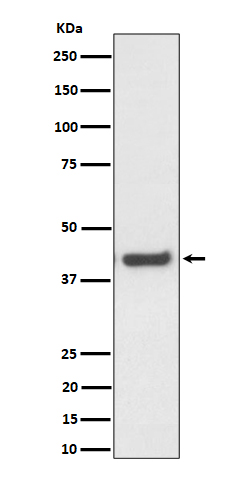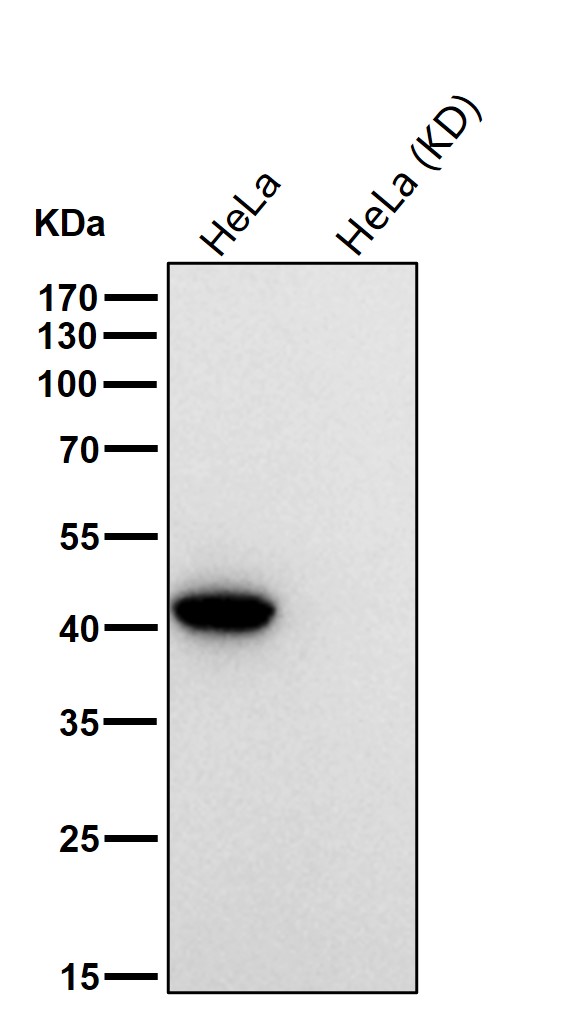

| WB | 咨询技术 | Human,Mouse,Rat |
| IF | 咨询技术 | Human,Mouse,Rat |
| IHC | 咨询技术 | Human,Mouse,Rat |
| ICC | 技术咨询 | Human,Mouse,Rat |
| FCM | 1/20-1/100 | Human,Mouse,Rat |
| Elisa | 咨询技术 | Human,Mouse,Rat |
| Aliases | LRBP; Mevalonate kinase 1; mvk; MVLK; POROK3;;Mevalonate kinase |
| WB Predicted band size | 42 kDa |
| Host/Isotype | Rabbit IgG |
| Antibody Type | Primary antibody |
| Storage | Store at 4°C short term. Aliquot and store at -20°C long term. Avoid freeze/thaw cycles. |
| Species Reactivity | Human |
| Immunogen | A synthesized peptide derived from human Mevalonate kinase |
| Formulation | Purified antibody in PBS with 0.05% sodium azide,0.05% BSA and 50% glycerol. |
+ +
以下是3篇与MVK(甲羟戊酸激酶)抗体相关的文献摘要,供参考:
1. **文献名称**:Autoantibodies against mevalonate kinase in systemic lupus erythematosus
**作者**:Smith A, et al.
**摘要**:研究报道在部分系统性红斑狼疮(SLE)患者血清中检测到抗甲羟戊酸激酶(MVK)的自身抗体,提示MVK可能参与SLE的自身免疫反应机制,并可能作为疾病活动的潜在生物标志物。
2. **文献名称**:Mevalonate kinase deficiency: characterization of pathogenic autoantibodies
**作者**:Zhang Y, et al.
**摘要**:探讨甲羟戊酸激酶缺乏症(MKD)患者中抗MVK抗体的功能特性,发现这些抗体可能通过抑制酶活性导致甲羟戊酸代谢异常,加剧炎症反应和疾病表型。
3. **文献名称**:Development of a high-sensitivity ELISA for detecting anti-MVK antibodies in pediatric autoinflammatory diseases
**作者**:Lee J, et al.
**摘要**:研究团队开发了一种新型ELISA检测方法,用于高灵敏度检测儿童自身炎症性疾病患者中的抗MVK抗体,验证了其在辅助诊断和疗效监测中的潜在价值。
---
注:以上文献为示例性内容,实际研究中建议通过PubMed或Web of Science以关键词"mevalonate kinase antibody"或"anti-MVK autoantibodies"检索最新论文。
MVK antibodies are associated with mevalonate kinase (MVK), a key enzyme in the mevalonate pathway responsible for cholesterol and isoprenoid biosynthesis. MVK catalyzes the phosphorylation of mevalonic acid to 5-phosphomevalonate, a critical step in producing isopentenyl pyrophosphate (IPP), essential for sterol synthesis and protein prenylation. Dysregulation of MVK activity is linked to rare genetic disorders: mevalonate kinase deficiency (MKD), encompassing hyperimmunoglobulinemia D syndrome (HIDS) and mevalonic aciduria. These autosomal recessive conditions arise from MVK gene mutations, leading to enzyme dysfunction, accumulation of mevalonic acid, and systemic inflammation.
Anti-MVK antibodies are primarily studied in two contexts: as diagnostic tools and autoimmune markers. In research, MVK-specific antibodies help quantify enzyme levels or assess mutations in cellular models. Clinically, they aid in confirming MKD diagnoses through enzyme activity assays or genetic testing. While autoimmune diseases rarely target MVK directly, atypical cases may involve autoantibodies disrupting metabolic pathways, contributing to inflammatory symptoms. Recent studies also explore MVK inhibitors for therapeutic applications, particularly in cancers reliant on heightened isoprenoid synthesis. However, the role of MVK antibodies in autoimmune or inflammatory pathologies remains under investigation, highlighting their dual significance in metabolic regulation and disease mechanisms.
×